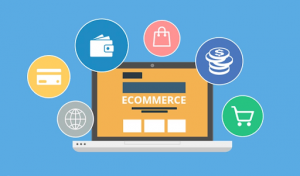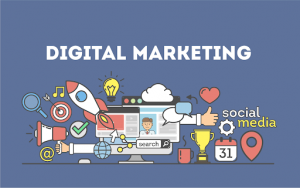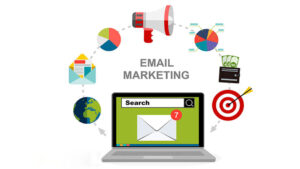
E-commerce is one of the fastest-growing sectors in the world, with global online sales expected to reach $6.5 trillion by 2023.
However, with increasing competition and changing consumer behavior, e-commerce businesses need to adopt effective digital marketing strategies to stand out and attract customers.
In this blog, we will explore why digital marketing important in e-commerce, what are the benefits of digital marketing in e-commerce, what are the key digital marketing strategies for e-commerce, and how digital marketing plays a role in e-commerce success stories.
We will also discuss the challenges and opportunities in digital marketing for e-commerce in the future.

E-commerce has been growing rapidly in the past decade, thanks to the advancement of technology, the proliferation of mobile devices, the expansion of internet access, and the shift of consumer preferences.
According to Statista, global e-commerce sales reached $4.28 trillion in 2020, up from $3.53 trillion in 2019, and are projected to grow to $6.54 trillion by 2023.
The COVID-19 pandemic also accelerated the growth of e-commerce, as more people turned to online shopping for convenience, safety, and variety. E-commerce is not only growing in terms of sales, but also in terms of market share, customer base, product categories, and geographic reach.
Accounted for 18% of total retail sales worldwide in 2020, up from 14.1% in 2019, and is expected to reach 22% by 2023.
Also attracted more than 2.14 billion digital buyers in 2020, up from 1.92 billion in 2019, and is expected to reach 2.41 billion by 2023.
Expanded its product offerings beyond traditional categories such as clothing, electronics, books, to include new categories such as groceries, health and beauty products, home and garden products, and digital goods.
Increased its geographic reach, with emerging markets such as China, India, Brazil, and Southeast Asia driving the growth of e-commerce.

Digital marketing is the use of digital channels and platforms to promote products or services to potential and existing customers. Digital marketing encompasses various activities such as search engine opt
imization (SEO), search engine marketing (SEM), social media marketing (SMM), email marketing, content marketing, video marketing, influencer marketing, mobile marketing, web analytics, and more.
Digital marketing differs from traditional marketing in several ways.

As a result of all of the benefits it provides, digital marketing is crucial for e-commerce enterprises in order to assist them reach their goals and objectives. Some of the benefits of digital marketing in e-commerce are:
Digital marketing can help e-commerce businesses increase their visibility and awareness among potential customers by using various channels and social media networks, email newsletters, blogs, videos, podcasts, and more. By creating and distributing relevant, valuable, and engaging content, e-commerce businesses can attract and retain customers’ attention and interest, and build trust and credibility.
E-commerce businesses can use digital marketing to increase traffic to their websites or online stores by utilizing a variety of strategies, including SEO, SEM, SMM, email marketing, content marketing, video marketing, influencer marketing, and more.
By optimizing their websites or online stores for user experience, usability, speed, design, navigation, and security, e-commerce businesses can also increase their conversion rates and generate more sales and revenue.
Digital marketing can help e-commerce businesses increase their customer loyalty and retention by using various methods such as email marketing, social media marketing, content marketing, video marketing, influencer marketing, mobile marketing, web analytics, and more.
By providing personalized offers, recommendations, feedback, support, and rewards, e-commerce businesses can enhance their customer satisfaction and loyalty, and encourage repeat purchases and referrals.
By utilizing a variety of tactics, including SEO, SEM, SMM, email marketing, content marketing, video marketing, influencer marketing, mobile marketing, web analytics, and more, digital marketing may help e-commerce enterprises strengthen their competitive advantage and distinction.
E-commerce businesses may differentiate themselves from their rivals and establish a unique identity and reputation by developing and offering distinctive value propositions, brand stories, customer testimonials, user-generated content, social proof, and more.

To leverage the benefits of digital marketing in e-commerce, e-commerce businesses need to implement effective digital marketing strategies that suit their goals and objectives. Some of the key digital marketing strategies for e-commerce are:

the process of improving the visibility and ranking of a website or online store on search engines such as Google or Bing. SEO involves various aspects such as keyword research, content creation and optimization link building, technical SEO, local SEO, and more. SEO can help e-commerce businesses increase their organic traffic, brand awareness, and authority, and drive more qualified leads and customers to their websites or online stores.

the process of using paid advertising to promote a website or online store on search engines such as Google or Bing. SEM involves various aspects such as keyword research, ad creation and optimization, bidding and budgeting, landing page optimization, and more. SEM can help e-commerce businesses increase their visibility, reach, and conversions, and target specific audiences based on their location, demographics, interests, and behavior.

the process of using social media platforms such as Facebook, Instagram, Twitter, LinkedIn, YouTube, Pinterest, and more to promote a website or online store. SMM involves various aspects such as content creation and curation, posting and scheduling, engagement and interaction, analytics and reporting, and more. SMM can help e-commerce businesses increase their brand awareness, recognition, and loyalty, and build relationships and communities with their customers and prospects.

the process of using email to communicate with potential and existing customers. Email marketing involves various aspects such as email list building and segmentation, email content creation and personalization, email delivery and automation, email testing and optimization, email analytics and reporting, and more. Email marketing can help e-commerce businesses increase their customer retention, loyalty, and advocacy, and drive more traffic and conversions to their websites or online stores.

the process of creating and distributing relevant, valuable, and engaging content to attract and retain customers. Content marketing involves various aspects such as content strategy, content creation and curation, content distribution and promotion, content measurement and evaluation, and more. Content marketing can help e-commerce businesses increase their brand awareness, trust, and credibility, and educate and inform their customers and prospects about their products or services.

the process of using videos to promote a website or online store. Video marketing involves various aspects such as video production and editing, video optimization and SEO, video distribution and promotion, video analytics and reporting, and more.
VM can help e-commerce businesses increase their visibility, engagement, and conversions, and showcase their products or services in a more appealing and interactive way.

the process of using influential people such as celebrities, bloggers, vloggers, experts, or advocates to promote a website or online store. Influencer marketing involves various aspects such as influencer research and outreach, influencer collaboration and management, influencer content creation and approval, influencer compensation and disclosure, influencer analytics and reporting, and more. Influencer marketing can help e-commerce businesses increase their brand awareness, reputation, and trust, and reach new and niche audiences through word-of-mouth and social proof.
A big part of the success of many e-commerce enterprises has been digital marketing. The following are a few instances of successful e-commerce ventures utilizing digital marketing:


E-commerce digital marketing has both potential and challenges. Among the difficulties e-commerce companies encounter with digital marketing are:
Digital marketing(DM) important in e-commerce because it can help e-commerce businesses achieve various goals and objectives such as:
DM can also help e-commerce businesses overcome various challenges and seize various opportunities in the dynamic and competitive e-commerce industry.
online businesses must use effective digital marketing tactics, such as:
online business must also use digital marketing to track and measure their performance and outcomes, and modify as necessary. Digital advertising is a potent instrument that can aid online retailers in expanding and succeeding.
Are you looking to build an eCommerce website for your online store? EWDC is the best choice!
We have helped hundreds of online businesses achieve their goals and grow their online presence. We can do the same for you. Contact us today for a free consultation. If you have any questions or feedback, please feel free to leave a comment below. We look forward to hearing from you.😊